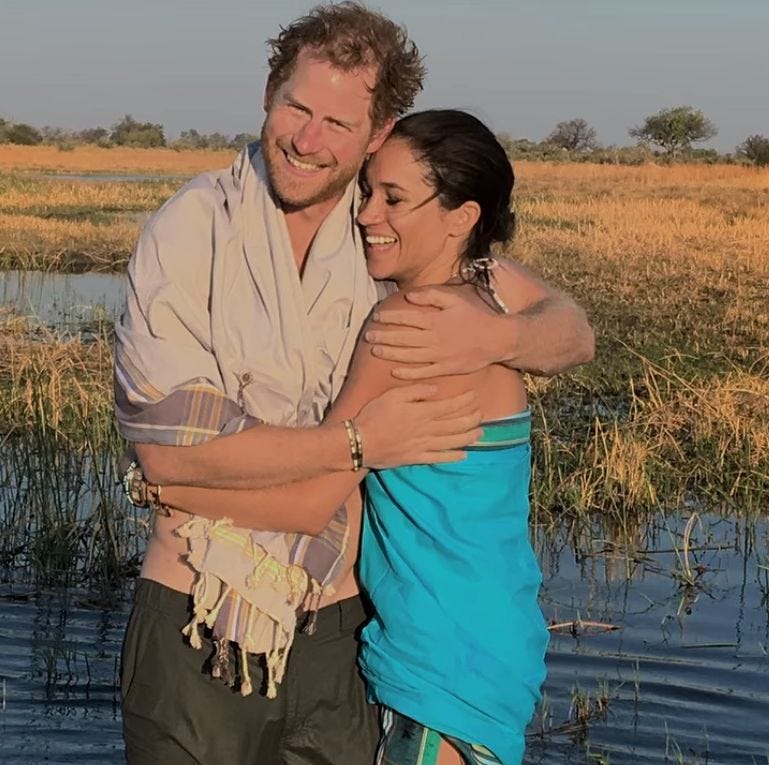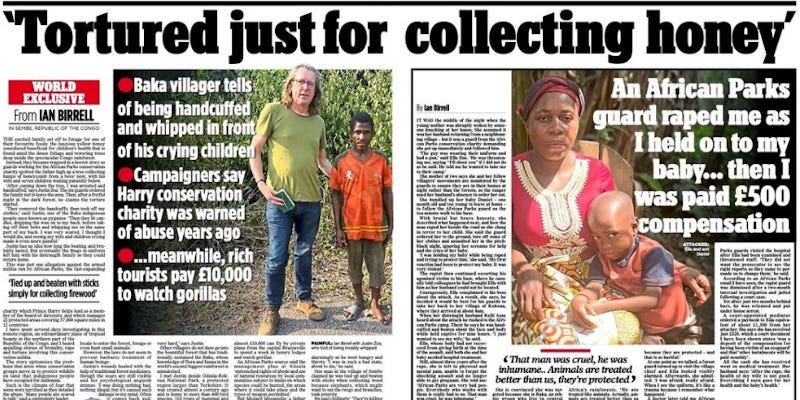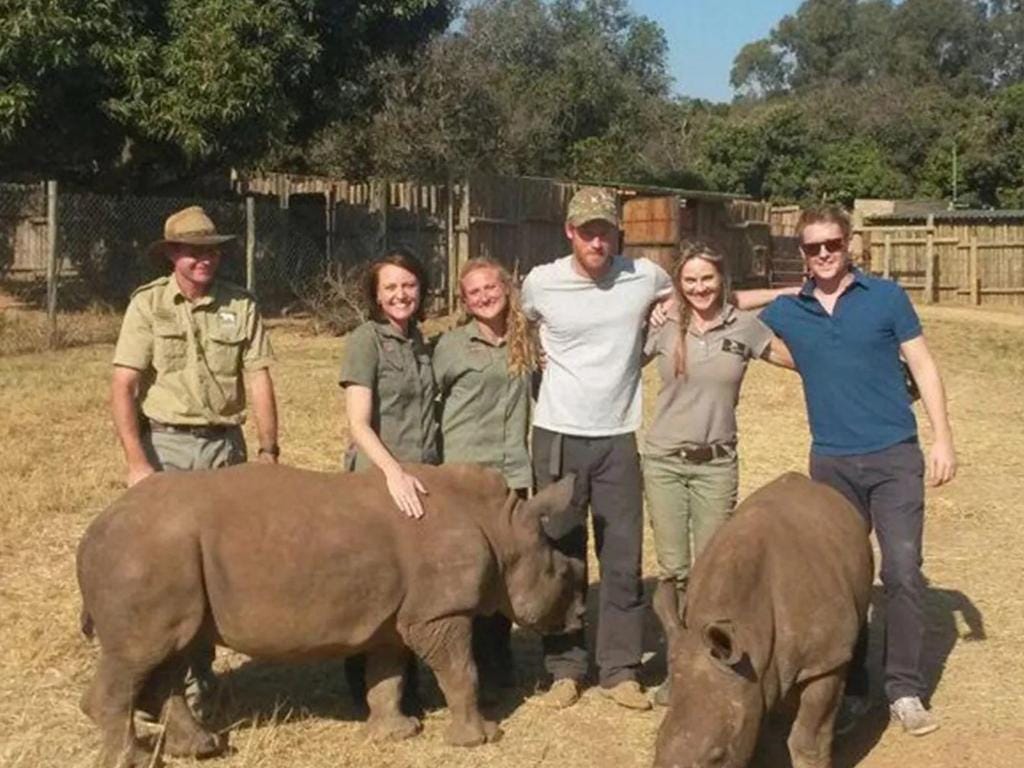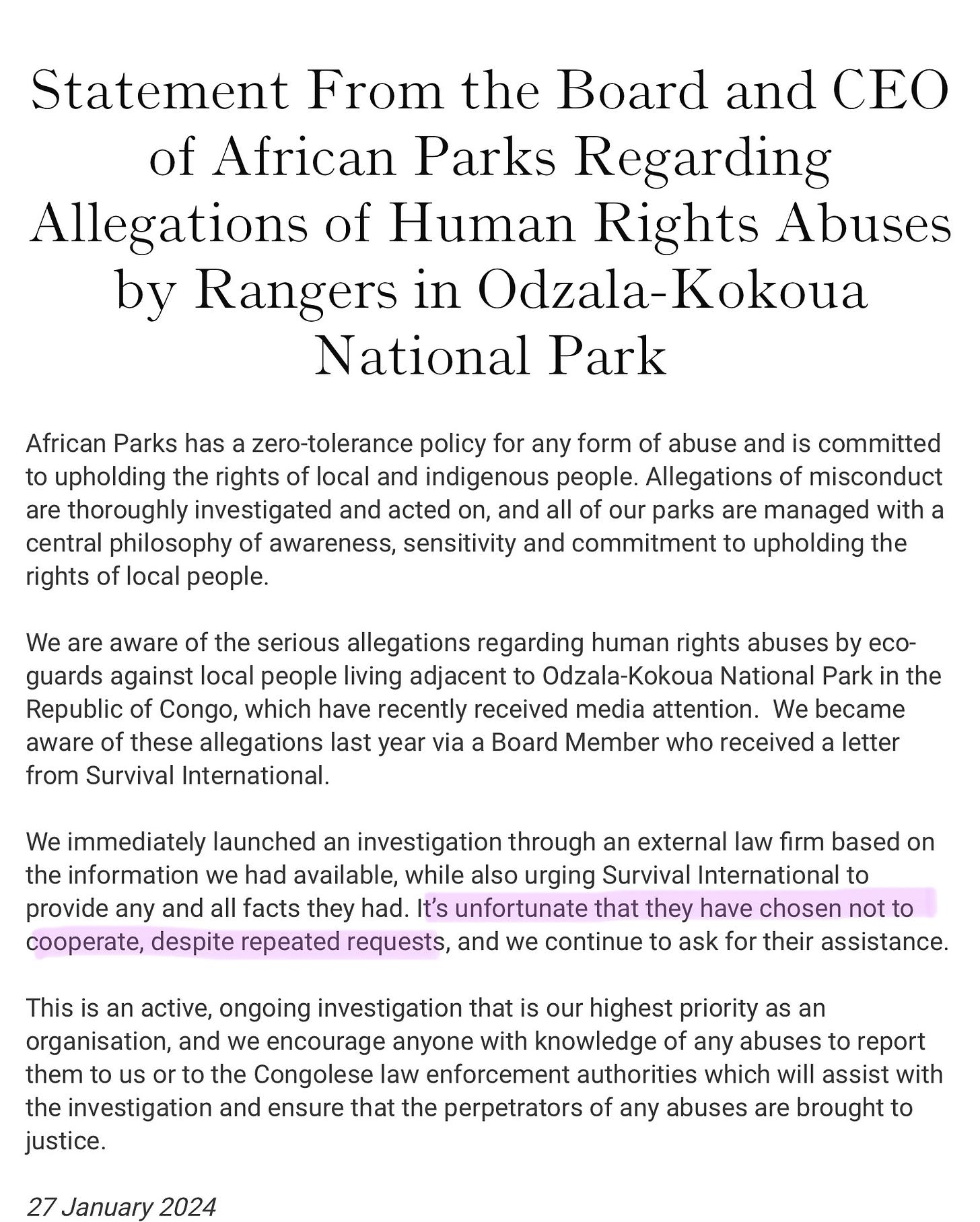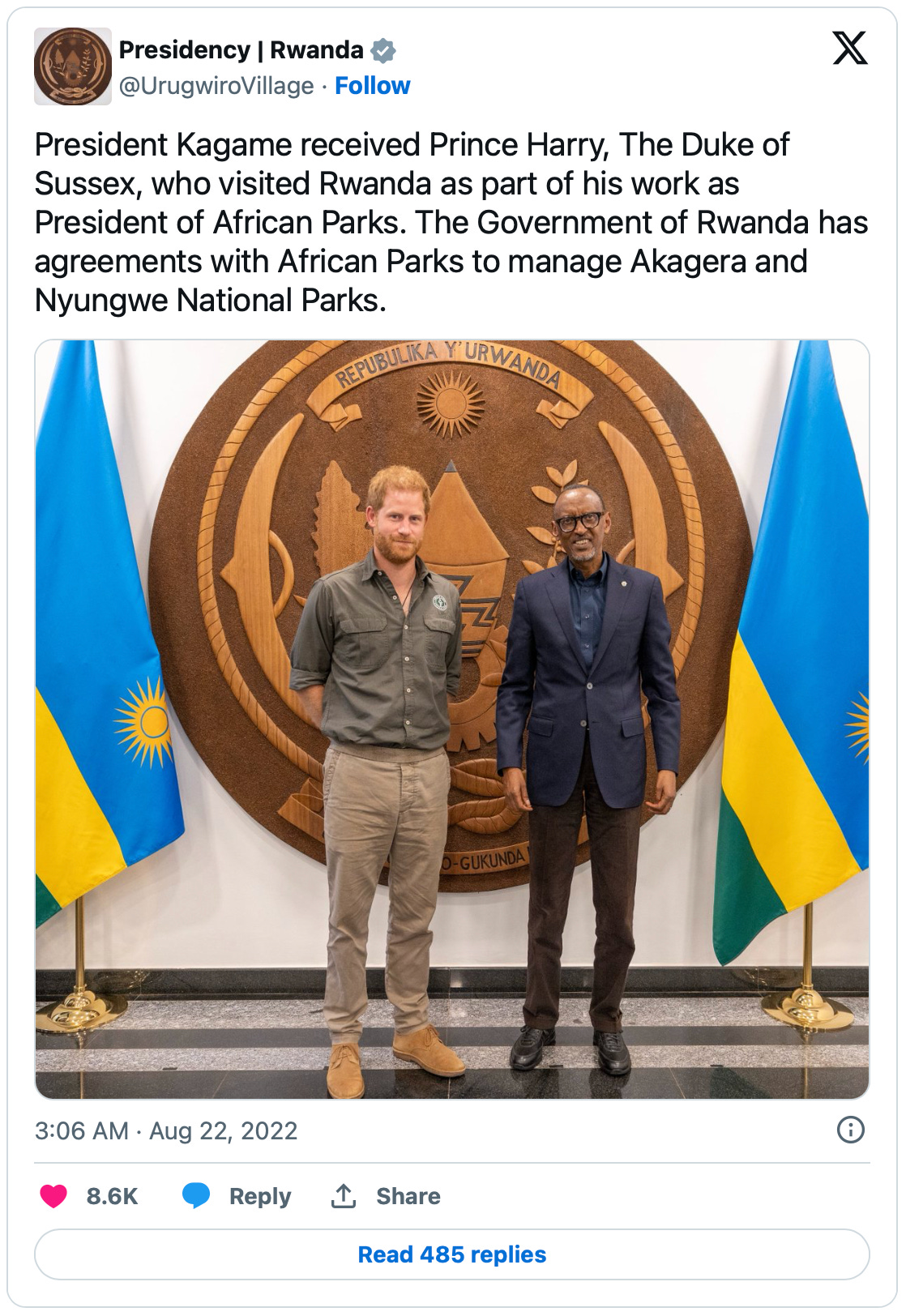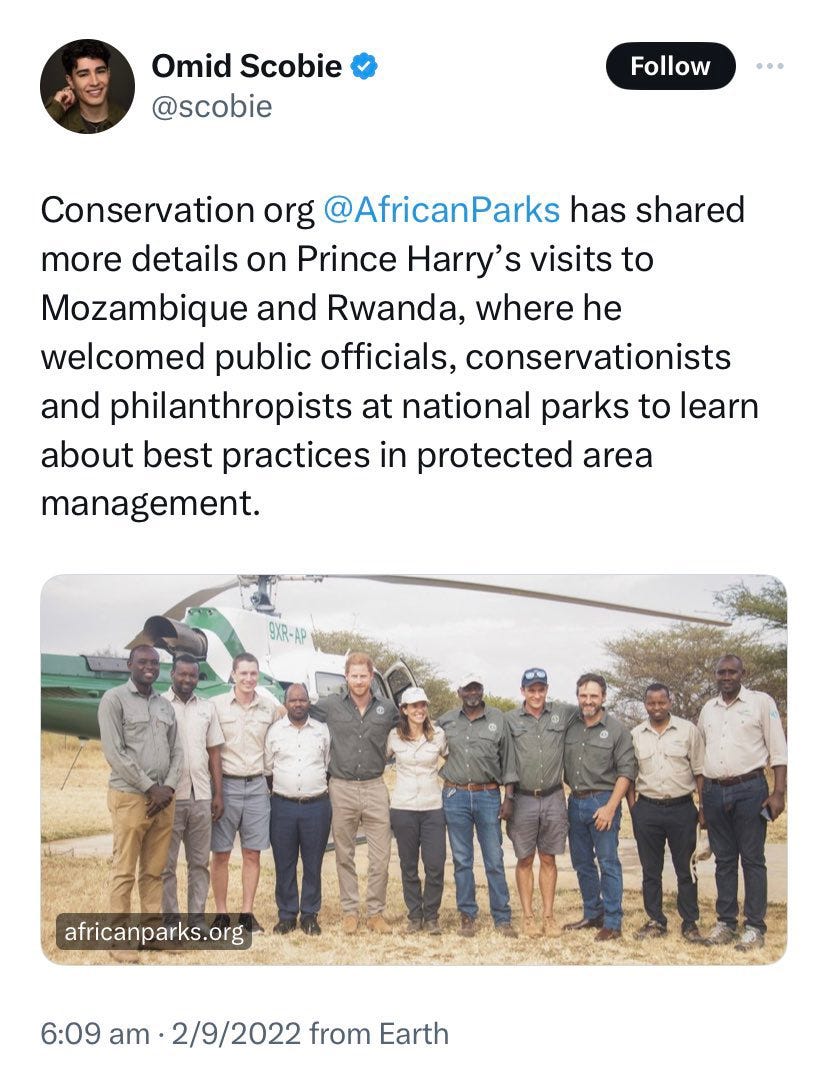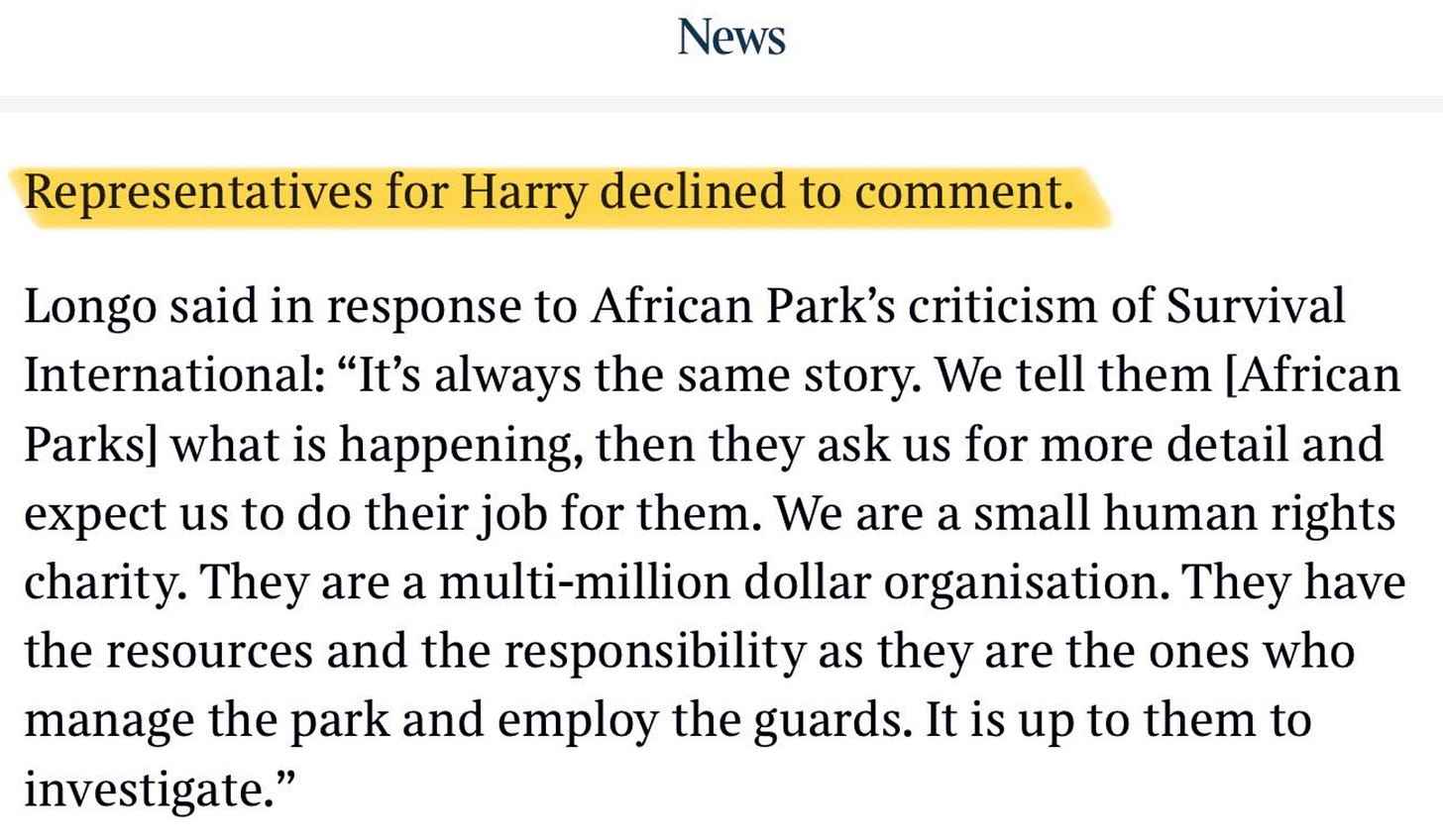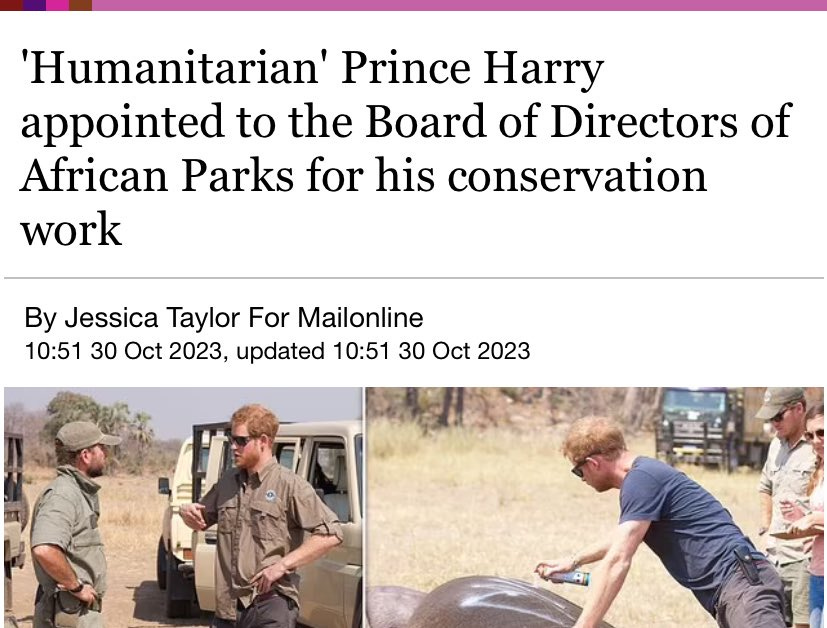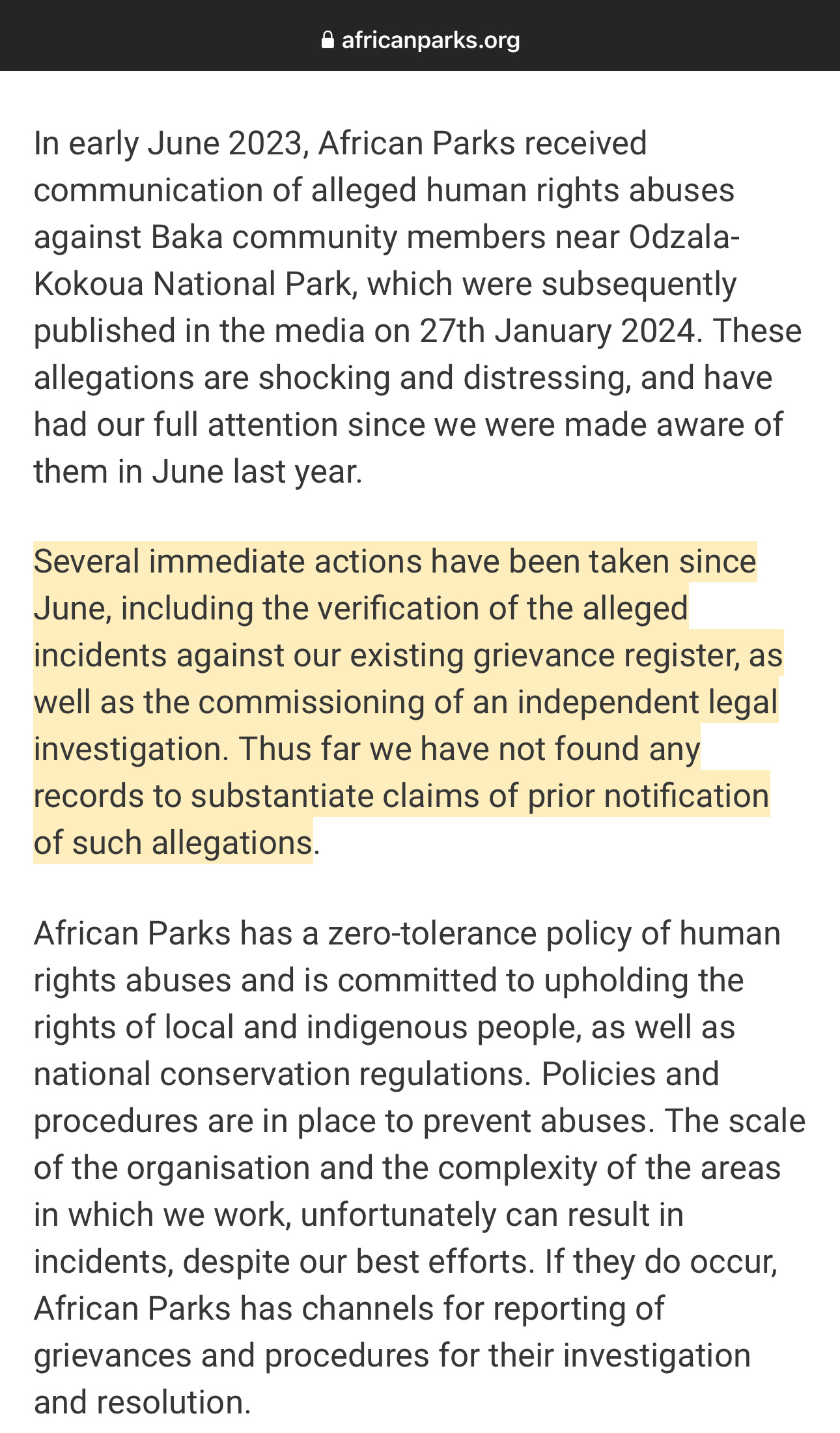Prince Harry Promotes his “Africa” Credentials in New York
Despite reports of human rights abuses at Harry's charity African Parks that surfaced in January, the Duke of Sussex continues to 'advance' its causes

Hello Dear Readers.
When it was announced last month that Prince Harry’d be visiting New York City during the UN General Assembly High-level Week and Climate Week to “advance a number of his patronages and philanthropic initiatives”, we were hopeful that it’d be a promising start. In our view, these type of engagements are far more encouraging than a faux royal tour or attempting to get his way towards his family via the press. But when we read this line in the press release, we did a double take:
“He [Prince Harry] will participate in engagements with African Parks, The HALO Trust, The Diana Award, and Travalyst.”
Ah.
Prince Harry became involved with African Parks seven years ago after a visit to Malawi to assist an elephant project. “What I see in the African Parks model is exactly what conservation should be about — putting people at the heart of the solution,” he has previously said. But in January of this year, horrible allegations were publicized by Survival International and they recounted a culture of terrorism of indigenous people by the very people Harry’s charity employed. They accused African Parks of being more interested in sweeping torture under the rug in favor of creating pristine [read areas with no indigenous populations about] landscapes for rich, white European tourists to enjoy Africa.
How and why is Harry still using his platform to support this charity?
Did anything actually come of the investigation African Parks claimed they would undergo?
And how does this play into the estrangement between Prince William and Prince Harry?
The next portion of newsletter may be old news to our paid subscribers, but we decided this topic was too important to put behind a paywall. We’re going to re-publish parts of the newsletter we posted in April giving background on African Parks and the accusations. We detailed why this version of White Savior Tourism does a disservice to conservation and the indigenous people that live on the land.
Prince Harry's Charity Facing MORE Torture Claims
Prince Harry became involved with African Parks seven years ago after a visit to Malawi to assist an elephant project. “What I see in the African Parks model is exactly what conservation should be about — putting people at the heart of the solution,” he has previously said.
It’s a huge disappointment that Prince Harry continues to throw his weight behind this model and uses his platform to legitimize such a problematic organization. It’s past time to decolonize conservation
At the tail end of this newsletter, after the re-publishing, we’re going to discuss updates we’ve been able to source online. But first, a definition of what we mean by White Savior Tourism.
White Savior Tourism
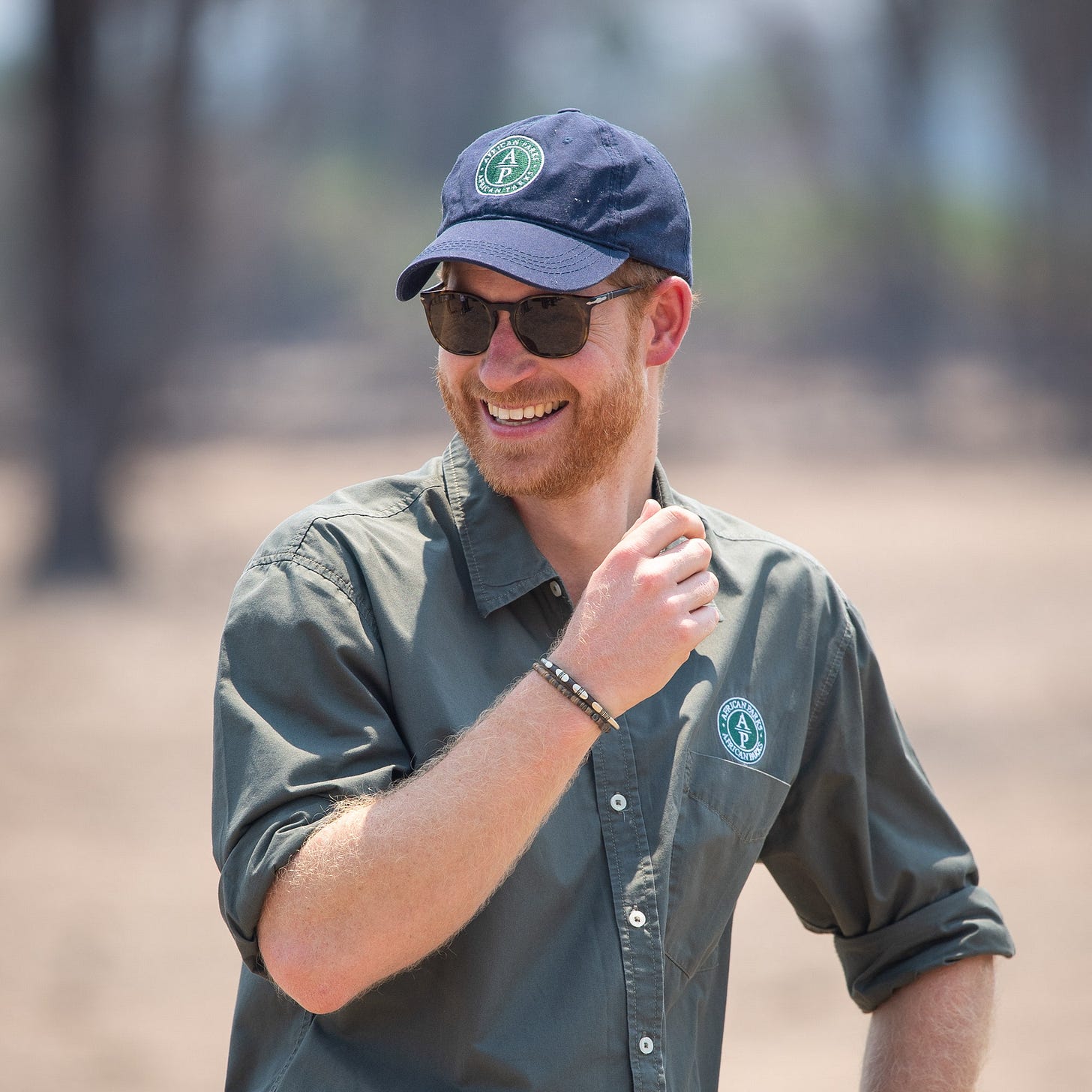
One has to wonder what “conservation” is to African Parks. The purpose of good PR is to blur the reality, the visceral truth, and replace it with a neat narrative, packaged with pretty tinsel for consumers. The first story about the atrocities being done focused on the Baka and Indigenous hunter gathers who’ve lived in, protected and shaped the Congo Basin rainforest for generations. They are the ones facing human rights abuses in the name of conservation.
Africa Parks, a commercial company turned NGO, claims it’s preserving Sub-Saharan environments. In actuality, they’re privatizing wildlife reserves, running them with military discipline and keeping locals out, for the benefit of rich international tourists. African Parks runs 16 parks catering mostly for affluent western clients who can afford travel, guides and luxury lodges at up to $1600 a night. In Benin, African Parks plans to build a five-star lodge for its wealthiest customers and wants to increase hunting tourism, which in Pendjari (a region in Benin) generates as much revenue as photographic safaris; visitors can pay to hunt big game such as warthogs in three private reserves. Pendjari is also rich in plants with potential medicinal benefits known to traditional medicine. There’s a lot of money to be made.
Concessions for so-called conservation purposes (national parks, protected areas, nature reserves, etc.) have their roots in the ideas and beliefs that underpinned European colonization. The concept of Protected Areas originated in the United States in the late 1800s, founded on the desire to preserve ‘intact’ areas of ‘wilderness’ without human presence, mainly for elite hunting and the enjoyment of scenic beauty. Both Yellowstone and Yosemite National Parks were forcibly emptied of their inhabitants and provided the blueprint for ‘doing conservation’ that continues to the present day.
Safari tourism, where African Parks excels’s, simply a continuation of this tradition. Wealthy (predominantly white) tourists are paying large sums of money to stay in luxury hotels and receive permission to shoot animals (with guns or cameras) as trophies. Meanwhile, those indigenous populations that hunt for subsistence insidetheir territories-turned-park are labeled as poachers and criminalized. Such tourism relies on certain constructions of what ‘Africa’ means to those undertaking the safaris, which reveal the colonial mindset that created these reserves in the first place. That is why protected areas are mostly ‘people-free’ landscapes. People are rarely portrayed as an intrinsic part of nature, and if they are, they are depicted either as intruders or ‘poachers’, or as touristic landscapes for buying handcrafts or watching dances, or as guides or eco-guards working for a foreign company or NGO.
It’s this type of “Africa’ which Prince Harry holds dear to his heart and which Princess Diana also became known for. Harry’s first time there was as a 13 year old with his father after the death of his family. His experiences of the region have been that of a rich, white tourist playing Safari and spending time with the Lesotho Royal Family. It isn’t an experience of someone on the ground seeing the day-to-day lives of the people who inhabit this land. It was where he took all his girlfriends, most recently Meghan on their third date. They flew to the Okavango Delta where they spent most of their trip in a nearly $2,000-a-night deluxe tent at the Meno a Kweno “safari” camp. It’s an “Africa” created for rich tourists.
African Parks was founded by Dutch billionaire Paul van Vlissingen and it’s bankrolled by other billionaires like the Walton family and the Oppenheimers, whose fortune was founded on diamond mining in South Africa. Africa Parks and “conservation charities” like it make big terrariums to be enjoyed by the wealthy while pushing out people that conserved the environment for millennia. It’s pointlessly costly, inhumane, elitist, and presumptuous to think they can do better. The business model is they shut out the indigenous people from their land for conservation. They have no desire to change this model or seek a way to work with the local communities. If they did, this would have been addressed when the first reports is these clashes were reported years ago. This is a profitable business model which ensures people like Vlissingen can make significant money from the USA and European tourism markets. The majority of the directors of these “conservation” NGOs are rich, white men, backed by extremely wealthy white men. They offer exclusive wildlife experiences at a cost, out of reach of most Africans.
Archive Start
From the HRH Royal Tea Archives: 22/4/2024
Distressing Allegations
On 27 January 2024, a story broke in The Daily Mail reported by investigative journalist Ian Birrel. The details at the time made my stomach turn. Birrel interviewed indigenous Baka tribespeople in the Congo rainforest. They cataloged a list of atrocities against them: They were tortured for collecting honey, beaten to death, and a woman told a harrowing story of being raped as she held onto her baby. All of these inhumane acts were perpetrated by rangers from a Western-backed conservation group. A group which was been terrorizing them for years and destroyed the traditional lifestyles of the Baka people as they were forced into poverty. The charity at the root of these acts of barbarism? African Parks, a charity Prince Harry has held a leadership position in for close to a decade. You hadn’t heard about this story, you say? This isn’t surprising.
While I know many readers are quick to dismiss stories written in “British tabloids” as crap, I implore all of you reading to make an exception this time around. The Daily Mail did their homework, and it’s shame that a tabloid reputation means their investigative work is regularly discounted. If the Mail isn’t to your liking then please hear the words of Eyaya Nivrel, a Baka man who details what they went through.
I’d meant to dedicate a newsletter to this story when it was released earlier this year but of course, the word of King Charles’s diagnosis took over. Just a day later, the early beginnings of the #WheresKate campaign were beginning to take hold (a campaign likely started in response to the Daily Mail’s investigation). I’m not going to delay any longer. The Times’s Jane Flanagan and Kate Mansey released a story on Friday which is bringing this news back to the forefront by way of a new book Entrepreneurs in the Wild which “includes dozens of incidents of alleged abuse from interviews conducted with victims and those who claim to have perpetrated the abuse, including existing and former African Parks staff.”
In this newsletter we want to share my critiques of the colonialist tourism model Harry’s partial to (and the differences between this and the community-led approach Prince William favors) and how we believe it led to these acts of barbarity flourishing under his watch. We’ll share why it’s time to decolonize conservation. We’ll also discuss why we’re unlikely to see any traction in accountability. This story won’t go anywhere and it’s unlikely Prince Harry nor African Parks’ll receive the scrutiny they deserve for allowing this to happen. But before we get to why we believe that, a quick thought exercise to get out of the way that I’ve seen made online time and time again:
If I were to tell you that a charity based in Africa, of which Prince William was President for seven years, was credibly accused of human rights abuses such as rape, torture, and allegations of killings, what do you think the reaction from the mainstream British and American media would be? If indigenous African families claimed they had suffered years of savagery and brutality from armed guards employed by a 'top' conservation group with Prince William as the director,how do you believe social media would respond?
One of the more frustrating parts about royal watching lately’s accepting that much of what the press and social media gets up in arms about isn’t the cause célèbres themselves. Dear Readers: It’s all about schadenfreude, the uproar the outrage represents. The press is able to churn things out that gets clicks and bad faith actors latch on to said stories and use them as a cudgel to get their pound of flesh. This usually comes from the public figure at the center of it, whom the bad faith actors just so happen to dislike.
So how did we get here? A charity Harry was President of for seven years, and currently serving as a high ranking board member, being accused of these heinous crimes? We have to go back in time to understand what African Parks is and how it came to be.
How We Got Here
Birrell travelled to the Odzala-Kokoua National Park, where he spoke with members of the Baka indigenous group — once known as the pygmies — who recounted alleged atrocities committed by African Parks militia to stop them entering forests where they have traditionally foraged, fished and hunted. One woman alleged she was raped by a ranger in the forest as she held her one-year-old baby, while a teenage boy claimed he was paid for sex with another guard. Another Baka man allegedly died after being beaten and jailed without getting treatment, a community activist told the newspaper.
“The guy was wearing their uniform and had a gun,” said mother-of-two Ella Ene, who claims she was taken from her house and raped in the middle of the night by an African Parks guard as she clung onto her son Daniel.
“He was threatening me, saying ‘I’ll shoot you’ if I did not do as he said. He told me he wanted to take me to their camp. I was holding my baby while being raped and trying to protect him. My first reaction had been to protect my baby. It was very violent.”
Other Baka tribespeople recounted being too fearful to enter the forest due to the intimidation by guards.
“You pick a vegetable and the guards say it is food for an animal, so they beat you,” said Medard Mossendjo, a father-of-two from the village of Biessi.
Another man from the village of Sembe said he was tied up and beaten while collecting wood because elephants might want to eat the twigs and branches.
“They’re killing us slowly anyway,” he told the newspaper. “We’re suffering so much that we might as well be dead. I’m thinking of taking poison with my wife and children.”
When approached, a spokesman for Harry and Meghan’s Archewell foundation told the Mail:
“When the Duke became aware of these serious allegations, he immediately escalated them to the CEO and chairman of the board of African Parks, the appropriate people to handle next steps.”
Africa Parks issued their own statement saying the same. They had a “zero tolerance” policy for any form of abuse. But pay close attention to the highlighted portion below.
“It’s unfortunate that they have chosen not to cooperate, despite repeated requests and we continue to ask for their assistance”.
Dear Readers, is it just me or does anyone else find this attempt at blame sharing distasteful? It also revealed more potential issues, to me, at the time. Was African Parks not trusted by other organizations? Having read the allegations and this statement saying ‘all the facts’, I was inclined to wonder if they didn’t trust individuals at African Parks with specifics that might identify accusers. The first duty of Survival International as an advocacy group is to ensure no further harm or retaliation.
These ‘independent legal investigations’ are conducted (in part) by Doughty Street Chambers. Doughty Street Chambers are also involved in Harry’s claim against The Mail. Their ‘investigations’ team also specialize in ‘reputation management’. Stinks, doesn’t it?


Was this the help Prince Harry was able to provide? A law firm specializing in spin and damage control? It’s been nearly a year since he was made aware of these allegations. What fruit has the investigation yielded and what changes has it wrought in the organization?
Survival International responded to this jibe from Africa Parks:
They also went public with claims of victim intimidation. According to Survival International, representatives from Africa Parks’d go to hospitals and harass victims giving statements. And doctors who were interviewed said they felt pressure to lie about details which would incriminate the rangers employed by African Parks.
This is why, Dear Readers, there’s more than meets the eye to this story.
Concerns Repeatedly Ignored
Survival International, a human rights advocate group which has been trying to get justice for the Baka people says it first raised concerns 11 years ago with African Parks but claims their worries were ignored. “The scale and volume of violent intimidation and torture make clear that this is not aberrant behaviour by a few individuals,” Survival International said in a letter last May to Harry.
In 2020, a memo signed by Katharine MacGregor, the Deputy Secretary of the Department of the Interior, said her department “was made aware of human rights violations by Africa Parks that’d “been summarily dismissed by the charity after finding ‘no fault’”.
In an interview with ABC Australia, Fiore Longo, Director of Survival International said:
“It’s not like AP only learned that human rights violations were happening by reading the Daily Mail last week or in 2023. We told them about the abuses in 2013; we told them again in 2014; we published a report in 2017. In 2020, a US top official reported that African Parks dismissed human rights allegations finding no fault and that each of the allegations involved investigations that were opened and closed within six weeks and either managed or conducted by African Parks”.
She added:
“The GAO report shows clearly how 'reported allegations are investigated' by African Parks: A man accused park rangers at Odzala-Kokoua National Park of forcing him to drink gasoline in 2019. African Parks investigated this allegation and concluded that the man had voluntarily drunk the gasoline".
Survival International said they went to the press because they weren’t receiving the action they expected after communicating these atrocities were ongoing. They clearly made this situation public because, despite repeatedly flagging it to African Parks, nothing was done. Now lets dig into the timeline of this:
Survival International says they wrote a letter specifically to Harry in May 2023 and didn’t receive a response. So we know that Harry knew and his spokesperson accepts he knew. This’s an undeniable fact.
Harry via his spokesperson says upon being aware of these crimes, he “escalated” them to the CEO and Chairman of the Board of African Parks.
Bearing in mind, at this time, Harry was President of Africa Parks and had been so for six years. That’s a high-ranking leadership position that connotes some power and ability to effect change. And concerns of this nature were handed off to the Board and CEO? So what happened shortly after on 30 October? Harry was “elevated” to a new role on the Board of Directors complete with a splashy announcement in US celebrity magazine People.
The Duke of Sussex, 39, has been appointed as a member of the Board of Directors for African Parks Network, South Africa. Prince Harry got involved with the non-profit conservation group that manages national parks across the continent in 2016 and became president of the group the following year.
Five months after being made aware of human rights violations, rape and torture at a charity he was president of for over half a decade, he accepted an “elevated” post at the same charity and still joined the board? It seems the perceived cache of being a board member trumped decency. In plain speak, he knew and he didn’t act. Survival International deciding to go public with these stories so understandable. They had no choice. Imagine if you were in their shoes and you shared these stories with “President Prince Harry”. And a handful of months later, nothing was done but the “President” announces a new “elevated” position within the charity itself.
I have several questions. How does Harry hold the position of President of an organization for six years and not be aware of the claims of abuse conducted by employees of that organization against indigenous peoples? Imagine yourself taking the role of President of a non-profit that operates in a number of nations. For months you would be asking questions and doing research. You’d be aware of this situation within a few months from constantly asking questions, going back into old files, and even making visits. And once aware how could you turn your back on that knowledge? You couldn’t. You would confer and press forward and demand to know what steps can and have been taken. Harry did the exact opposite.
He did nothing, nothing for 6 years as President. Then, when they wrote to him specifically (presumably he was the President then), he hit the forward button on the email and never looked back. Never followed up. And got promoted. One of the questions a director should be asking is how much liability exposure there is for the organization. That doesn't sound like the most sympathetic take focusing on the organization rather than the indigenous people, but it’s just one area of responsibility where he could have extended a minimal effort to give a damn and wonder how the organization might be impacted and how best to react to protect the organization. But Harry’s unable to carry that level of responsibility. He hit the Forward button and washed his hands. A month after Harry forwarded the email, his intention to make an African documentary for Netflix was announced. And if I were a fly on the wall during the meetings, I’d predict the backdrop of African Parks’d be in the plans and part of the sell.
The day before this story was released, Harry and Meghan were on the red carpet in Jamaica for One Love.
Jetting off to Jamaica to watch a film seems even more foolish and frivolous now we know that a serious crisis regarding even more serious allegations was unfolding behind the scenes at an organization he’s a board member of. And they were likely aware the story was coming as the Mail reached out for comment. While we received a statement from his spokesperson, there was nothing from Harry. “Escalating” it clearly didn’t make a difference. That’s akin to saying ‘not my problem’. Harry’s now a member of the board and the entire board shares collective responsibility for the effective governance of the organization as said on African Park’s website. An ‘escalation’ doesn’t absolve him of responsibility or accountability. If that was the aim it was remarkably shortsighted - becoming a member of the board means he is more accountable, not less. The board, on which he now sits, share collective responsibility for the direction and governance. A responsibility he didn’t share as President.


Harry was kicked upstairs to the board and out of the line of fire after allegations of atrocities were reported to him as president of African Parks. After they became public, he pointed the finger of responsibility to the CEO, a man who Harry invited to his wedding.
There were calls for him to resign but no great resignation came. Nor did Harry issue any personal statements on these horrible acts comparably to ones he’d released for his lawsuits against the press by likening himself to a dragon slayer. And since then, not a word has been publicly expressed. Survival International went public because urgency of action wasn’t forthcoming. The story in the Times’ll also be ignored. In my opinion, similarly to Invictus and Sentabale, Africa Parks’s a necessary and convenient vehicle which Harry can ride to embiggen himself and play diplomat after no longer being allowed to royal. In Autumn of 2022, his trip to Africa to “lead” a US delegation to Africa was touted. In actuality, the delegation had nothing to do with Harry and their itinerary diverged at many points.
Harry’s role as “President” of African Parks allowed him to be present when foreign dignitaries were visiting and he was able to take photos with other political leaders. The tie to African Parks isn’t an association he’d be willing to give up lightly, heinous allegations or not. Another reason why he’d be reticent to cut ties? Fulfilling his contractual obligations with his existing media deals. Invictus was used to make a documentary for Netflix. He needs this association with African Parks for his documentary for Netflix. Without the ribbon cutting and engagements of being in the Firm, these leftover associations are his bread and butter.
William and Harry’s Differing Conservation Style
Shortly after the Africa Parks controversy became public knowledge in January 2024, Mansey at the Times had a very interesting story detailing how Prince William and Prince Harry’s differing conservation styles was one of the issues that fostered their estrangement.
Sharing a charitable foundation, William and Harry are said to have regularly disagreed on the best way to reduce poaching and save endangered species in Africa.
“They are both very passionate about saving protected species but didn’t always share the same view about how to run projects in Africa,” a well-placed source who knows both brothers said.
Harry prefers a “hands-on interventionist approach” to conservation and that’s seen in his partnership with African Parks. They hire guns to “protect” animals guns but don’t take into account the indigenous people who live on the land. There’s a lot of cash on hand thanks to investments by overseas businessman who profit from “Safari tours” but there’s very little accountability on the ground when the rangers tasked with “protecting animals” violently assault the indigenous people.
The Prince of Wales in comparison?
“William believes you should focus on community-led schemes where local people over time feel empowered to protect the land. Harry, on the other hand, was more interventionist. He felt that you need a more hands-on approach to ensure wildlife habitats were securely protected to enact change quickly.”
William’s approach was not without its dangers. His good friend Anton Mzimba, 42, a ranger in Kruger national park, was killed by gunmen.
William believed in empowering the local populations to protect the land and not relying so much on outside money to drive how conservationism is done. That familiarity’d likely lead to less tension with local indigenous populations. But Harry, who we all know to be a tad impatient, prefers a more hands-on, ie a we’ll take over approach, because it “enacts change quickly. The struggle with that?
The firm-handed approach favoured by Harry, however, requires generous donations from western donors, and has fuelled tensions with communities who have been cut off from age-old grazing and herding routes.
The article’s quite good and I suggest taking the time to read if you have it. Prince William’s conservationist group United for Wildlife takes a completely different approach. It focuses on disrupting the trafficking supply chain by partnering with local governments to seize contraband and prosecute confirmed poachers, championing methods to root out trafficked goods in ports of entry, empowering local governments to prioritize penalizing and investing in on-the-ground failsafes to end trafficking and training the local population to have a stake in conservation. This approach may seem hands off and slow, but it 1) Reduces liability, 2) Removes safari tourism and profit options from the table and 3) Incentives collaboration without putting indigenous peoples in the cross hairs. Nowhere in their Taskforces is funding a fleet of rangers a high ranking goal.
It’s our impression that as he got older, William grew out of his white savior “Magical Africa” phase that all royals are innately born with. Whereas Africa is a destination Harry traveled to regularly on safari tours with girlfriends, William prefers the Isles of Sicily or stay at home vacations in Norfolk. He isn’t passing on the soft colonialism of Africa to his children, which we can appreciate as it does get old.
“Harry has neither the tools nor experience to navigate his way through such crises,” they told The Times, backing demands for him to step down.
A segment of this article we also wholeheartedly agreed with is a former member of the African Parks management team giving their opinion on Harry and how he’s navigating this crisis:
Now a former member of African Parks’ management team, who asked not to be named, has questioned the Duke of Sussex’s suitability for a governance role guiding the charity’s management through complex and dangerous contexts.
“Harry has neither the tools nor experience to navigate his way through such crises,” they told The Times, backing demands for him to step down.
The late Dutch billionaire Paul van Vlissingen was among the organisation’s founders in 2000, seeing in it “an African solution for Africa’s conservation challenges”. But elevating Harry to a position of influence has just reinforced criticism of the charity as “green colonialism”. Half of the current board of eight are white and only one is a woman.
The former African Parks executive said: “By stacking boards with white males and failing to embrace the perspectives of black Africans and women, leadership is bound to be stilted. Yes, there is a role for celebrities as patrons or ambassadors, but not on a governing board.”
Being a Patron doesn’t mean you have responsibility for an organization. A member of the board does. I don’t think Harry’s fully to blame. But neither is he blameless. His action amounted to nothing but tying himself more to the charity and his statement via a spokesperson was as sterile as they come. He chooses who to get involved with. As President, he used the position to launch himself as a global leader during the pandemic by lauding his foreign policy credentials.
He chose to join the board knowing these issues. So, in our mind, he deserves the opprobrium. He sits on the board. The board’s collectively responsible (as per their own report) for governance. If Prince Harry can tout “welcoming foreign dignitaries” and pitch documentaries about Africa, he should also be expected to share this responsibility? An attempt to absolve himself from this are distasteful and incorrect. He should be demanding action, not passing the buck. Survival International have said they warned African Parks repeatedly over a period of 10 years. Ten. Harry’s actions were simply to pass it on and wash his hands of the situation. That’s inaction. And that’s pitiful. And unfortunately, I agree with the unnamed former African Parks management team member: This is sadly all Harry’s capable of doing.
This is why having a team vetting what you’re involved with’s so important. Harry used his promotion to board member for PR, but has never used his position (either with African Parks or just his public profile) to speak out forcefully about these atrocities.
The last thing Africa (or any of us) need is for Harry to step into a controversial issue unprepared. Claims of atrocities by “armed militias” are for local governments and their politicians. If Harry knew this a year ago he should have stepped down, not elevated himself to the board.
His silence on this issue becomes more and more deafening. He and Meghan are always happy to jump on any bandwagon and tout their philanthropic credentials, and yet seem excruciatingly slow to respond, especially given that this situation was known to Harry in May of last year. If he was just now informed, it seems like a cautious response was warranted, given that it does take time to verify things especially in this part of the world. But Harry has known this was going on since May, and still continued with the relationship.
Did African Parks sweep it all under the rug?
Did they deny all of these allegations to Harry?
Did Harry even review the reports provided by Survival International? Did he bother to follow up?
There are many, many questions but few answers and absolute silence from the Sussexes, except for one vague press statement when the report first came out we think Harry has no clue what to do or which direction to turn. He’s without the Palace machine who would’ve advised him long ago what to do and his inexperience is showing. He isn’t equipped to handle this. we think the walls are closing in on him and it’s a bit scary to think what direction he might go. This is serious stuff. We think he ignored it or just thought it had been handled without looking into it because he’s never had to be involved like this in the past. However, given that this has been reported on by Survival International for years, his ignorance or outright ignorance is glaring.
The people who run and fund African Parks are the same people who fund an aggressive, militarized approach to protect wildlife over the lives of African people. And Harry, 'I miss Africa', is casually sitting among them. And for all of the talk about colonialism with William and Catherine during the Queen’s Jubilee tour a few years back, Harry’s association with African Parks is as colonialist, ten-fold, in every aspect. Yet it receives just iota of the scrutiny when this needs as much shining a light as possible. The truth is, he sees this model of conservation as the “right” way to go about things. Himself as “the white savior”, whether he wants to admit it or not.
Of all the excuses “What could Harry have done?” has got to be about the worse. African Parks run the parks and pays the guards. They can educate. They can enforce. They can root out and penalize. In short, they can make a difference. If African Parks knew about this (they do) and haven’t done this (they haven’t) they are at fault. The one thing Harry has is his voice. He has used his platform for moaning and whining and telling the world of petty or confected slights against him. Imagine the good he could’ve have done here instead.
Archive End
African Parks in the Present - 23/9/2024
Dear Readers, now that subscribers free and paid alike, have access into our investigation and opinions on the very credible and distressing indications of crimes against humanity made by Survival International against the militant-grade rangers employed by Prince Harry’s charity, African Parks, we can talk about what’s happened since we originally published my thoughts.
Two months after the original stories were published in January of this year, new fresh allegations were made at another location African Parks managed. This time in Zambia and the testimony was eerily similar to that of the Baka People:
An investigation by this newspaper has found evidence that, in September 2021, a marketplace was sprayed with gunfire that left scores of villagers injured, including young children.
Allegations of brutality have surfaced in Zambia’s Bangweulu Wetlands, a conservation area almost the size of Devon that is home to 50,000 indigenous people who have the right to ‘sustainably harvest’ natural resources such as fish, antelope and rabbits.
Impoverished people in Bangweulu, one of Africa's most important wetlands, now say they are suffering a campaign of intimidation to stop them fishing and hunting on their own land while tourists arrive on safari expeditions that can cost up to £5,000 a day.
‘Our home has become a nightmare that frightens us every day,’ said Luni Elo, who was shot during the attack at Muwele village's market. Farmer Chipulu Mwale, 23, who was also wounded, pleaded for African Parks to leave: ‘They have turned this place into hell.’
The MoS has seen minutes from the biggest chiefdoms' council meetings that record claims of 'extra-judicial killings, maiming, severe beatings and torture'. The document says '12 people have been shot dead or beaten to death' and that poaching suspects are 'paraded naked in front of their families and neighbours'. Newton Ng'uni, the council chairman, claimed cases included a man killed after being caught fishing. 'They just beat him – but not a single ranger has been imprisoned,' he said.
Villagers in Muwele claim the market shooting happened after rangers arrested a man found with antelope meat, then chased a second suspect into the village in defiance of an agreement with the local community. This sparked protests and stone-throwing that damaged vehicles, including two belonging to African Parks.
A mere two months after this story, Prince Harry was in Los Angeles at a charity dinner raising funds for African Parks.
This fundraiser wasn’t acknowledged or listed on Archewell’s charity page. Nor was it confirmed by Prince Harry’s publicist. The press was tipped off to this event by actress Holly Robinson Peete and her husband who shared a photo from the gala. She removed the post an hour after she shared it and hasn’t spoken about it since. If we were to guess, we’d say she wasn’t aware of the allegations.
All this leads us to believe this show of support from Harry was supposed to stay under wraps. We believe Harry and his people knew this topic was radioactive. But they also knew that concerns for indigenous people in Africa would fade with time as the memory of the wider public is very short. We’re sad to say they were right. Harry and his people were just biding their time for a press release about his “power-packed” solo trip to New York City.
African Parks is a reflection of how Harry sees responsibility. More to the point, African Parks embodies the very model of colonialism: A organization lead by a rich and foreign male white board, which funds and arms African men to brutalize the indigenous African communities into submission; so they can steal their land and resources and make money. It’s quite ironic that the belief in royal watching spaces is it’s only the existence of a monarchy that creates this reality. It seems the only way people’ll care or hold this story to account is if a more senior royal, like say, Prince William was involved. This is the gift of having less scrutiny and low expectations. Being the Spare does have its perks, after all.
And what about African Parks? To the surprise of no one who’s made it this far into the newsletter, they haven’t provided many updates on this heinous situation. A second follow-up response to the claims in February said they “hand’t found any records to substantiate claims of prior notification of such allegations”. They also didn’t make a statement on the horrible murders of 12 people in Zambia made written about in March.
As our archival newsletter listed, this runs against what Director of Survival International, Fiore Longo said in an interview with ABC Australia.
We told them about the abuses in 2013; we told them again in 2014; we published a report in 2017. In 2020, a US top official reported that African Parks dismissed human rights allegations finding no fault and that each of the allegations involved investigations that were opened and closed within six weeks and either managed or conducted by African Parks”.
“The GAO report shows clearly how 'reported allegations are investigated' by African Parks: A man accused park rangers at Odzala-Kokoua National Park of forcing him to drink gasoline in 2019. African Parks investigated this allegation and concluded that the man had voluntarily drunk the gasoline".
And who can forget the memo signed by Katharine MacGregor, the Deputy Secretary of the Department of the Interior, who confirmed her department “was made aware of human rights violations by Africa Parks that’d “been summarily dismissed by the charity after finding ‘no fault’”.
Dear Readers, indigenous people deserve better.
The Baka people deserve better than whatever Prince Harry is “advancing” in New York. And without accountability and real change on his end, we won’t be covering any of his “power-packed” activities this week. We find it more than hypocritical that a man who runs a charity which hires rangers that rape and torture native people in Africa is giving a talk on “gender-based violence”. African Parks’s sweeping this shameful scandal under the rug, and Harry’s just letting them. He needs to clean house before offering useless platitudes in New York. It doesn’t matter how many important people he rubs shoulders with this week, at HRH Royal Tea, we will hold him to account.
To donate to Survival International and the vital work they do, please visit their donation page here.
Yours in Royal Tea,
Lady Sinclair







